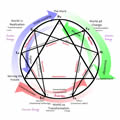What is it that Keeps Us from ‘Effective’ Reasoning? – Part 2
2015-01-12
Another aspect of our inner resistance is suggestion. I was just editing a chapter from Abdullah Dugan’s book, “The Quest” on this topic, when it struck me that both the positive and the negative effects of suggestions influence our ability to reason. In terms of the question, “What keeps us from being able to reason effectively?”, the following questions and responses are worth noting.
So real thought would be the only thing you could counter suggestion with?
“By using your three brains you can know how to weigh up a suggestion. You have to work in a balanced way to be able to understand suggestion. A suggestion may be levelled at your moving centre, and because of your experience in your moving centre you could say "That's just rubbish", whereas another person who wasn't developed in his moving centre would believe it. The main thing is to be selective. Usually people have no way of being able to differentiate between all the suggestions coming at them -- they just take everything, and react instead of acting. But as you develop yourself as a human being, not necessarily in the esoteric way, you start going against many of the suggestions because you can see they are wrong or stupid.”
Put another way, we have a resistance to “acting”, preferring instead the relatively easy path of passive reaction. Acting also means we take responsibility, that we mobilize our intention, and ultimately that we work in a balanced way. All of this takes effort and our passive nature resists this kind of effort. Ironically, our passive nature is quite willing to be very active toward maintaining its habits of passivity. Go figure!
Are you saying we should be in a positive state all the time, so negative suggestions can't enter?
“It would be too much to expect you to be in a positive state all the time. When a suggestion comes in you can call a halt, look at it, and if you see it is negative you can act against the negativity. For instance, if something causes you to react with jealousy, you say "This is nonsense, it’s just jealousy", and then you put something in its place by saying a prayer in your own mind. If you don't want to pray you can give yourself auto-suggestion. But you must put something back in place of the negativity.”
Strictly speaking this exchange is not really about resistance, but I was struck by the description of using a short form of the reasoning process…
“Call a halt. Look at it. See if it’s negative. Act against it with the admonition, ‘This is nonsense!’. Put something in its place.”
What about a man of principle where does he get those principles from? Is that also suggestion?
“It would originally be suggestion, but by his own mentation he may see the truth of a particular suggestion and then it becomes his. If you put a suggestion through the three brains and work it out as being correct, you can then act on it, not react.”
Another approach to reasoning… put it through the three brains.
Would fixed attitudes and principles be opposites?
“Not necessarily, because a principle may become a fixed attitude. Some ideas which manifest as fixed attitudes are really the result of your thinking. They have been put into you as a suggestion, you have thought them through and decided they were correct, and although they become fixed attitudes inasmuch as you have conviction that they are right, they are beyond fixed attitudes.”
We haven’t talked much about principles, but they are important for our reasoning process, because they act as rules, guidelines, personal laws; a kind of shorthand that makes reasoning in most situations much faster and more efficient, because sometimes we only have to ask whether we are following our principles.
But of course this gets back to the subject of resistance, because something in us doesn’t want to consistently follow principles… even if we are the source and originators of those principles.
- John Hutcherson's blog
- Log in to post comments
